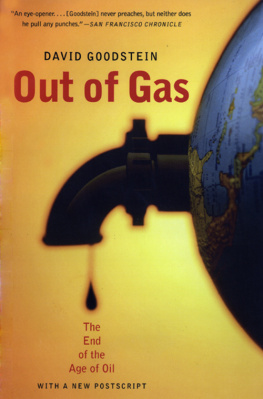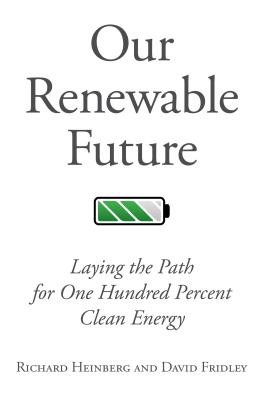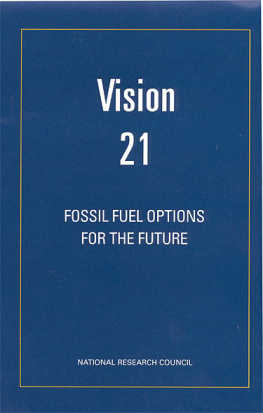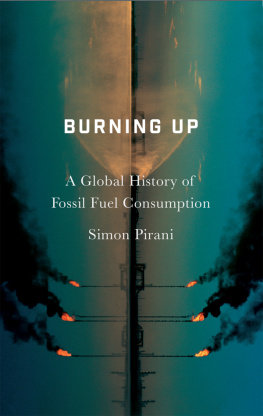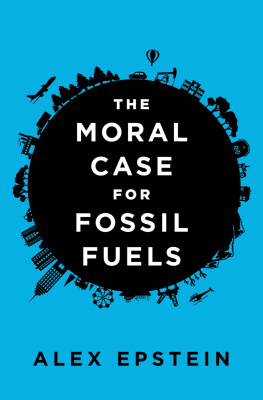
More Praise for Out of Gas
If you want to get a look at the whole forest at once, Goodsteins little book will float you appropriately high above the trees.
American Scientist
Goodsteins book is not a happy read, but an important one. In laymans terms, he explains the science behind his prediction and why other fossil fuels might not do the trick.
Newsweek
Out of Gas... isnt merely a polemic. Rather, its a well-reasoned argument that the world needs to quickly come up with new ideas about energy.... A book that Dick Cheneys energy task force should have read, and it should be mailed to Gov. Rick Perrys Energy Planning Council. Its an eye-opening look at what could be the worlds single biggest challenge.
Bill Day, San Antonio Express-News
A short, fascinating work meant as a primer on the relevant laws of nature.
Eli Sanders, Seattle Times
ALSO BY DAVID GOODSTEIN
Feynmans Lost Lecture (with Judith Goodstein)
Beyond the Mechanical Universe: From Electricity to Modern Physics (with Richard Olenick and Tom Apostol)
The Mechanical Universe: Mechanics and Heat, Advanced Edition (with Steven Frautschi, Richard Olenick, and Tom Apostol)
The Mechanical Universe: Introduction to Mechanics and Heat (with Richard Olenick and Tom Apostol)
States of Matter

W. W. Norton & Company New York London
To our children and grandchildren,
who will not inherit the riches that we inherited

OUT OF GAS
T he world will soon start to run out of conventionally produced, cheap oil. If we manage somehow to overcome that shock by shifting the burden to coal and natural gas, the two other primary fossil fuels, life may go on more or less as it has beenuntil we start to run out of all fossil fuels by the end of this century. And by the time we have burned up all that fuel, we may well have rendered the planet unfit for human life. Even if human life does go on, civilization as we know it will not survive, unless we can find a way to live without fossil fuels.
Technically, it might be possible to accomplish that. Power plants can run on nuclear energy or sunlight. Part of that power can be used to generate hydrogen fuel or charge advanced batteries for use in transportation. There are huge technical problems to be solved, certainly, but most of the scientific principles are well understood, and human beings are very good at solving technical problems. In fact if we put our minds to it, we could start trying to kick the fossil fuel habit now, protecting the planets climate from further damage and preserving the fuels for future generations as the source of chemical goods. Ninety percent of the organic chemicals we usepharmaceuticals, agricultural chemicals, plasticsare made from petroleum; there are better uses for the stuff than burning it up. To make such an about-face will require global political leadership that is both visionary and courageous. It seems unlikely that we will be so lucky.

Of all the fossil fuels, oil is the most important to us by far. Its existence has been known since ancient times, because of natural seepages at the surface of the earth. Ancient peoples in the Middle East and the Americas used oil for a variety of medicinal, military, and other purposes. It was thought to be useful as a laxative, for example. (Dont try this at home!) And oil-soaked blazing arrows were used by the Persians in the siege of Athens in 480 BCE. But by and large, oil was little needed and little used until the nineteenth century.
By the beginning of the nineteenth century, the growth of urban centers made it necessary to search for better means of illumination. For a while, whale oil lamps served the purpose and whaling became a significant industry. But by the middle of the century, whales were becoming scarce. Kerosene derived from coal was widely used, but a better substitute for whale oil was needed. In August 1859, Edwin L. Drake, a former conductor on the New York & New Haven Railroad, drilled the worlds first oil well at a natural seepage near Titusville, in northwestern Pennsylvania. Soon coal-oil refineries were processing cheap oil instead of coal. Then in 1861 the German entrepreneur Nikolaus Otto invented the first gasoline-burning engine (see
In the 1950s, Shell Oil Company geophysicist M. King Hubbert predicted that the rate at which oil could be extracted from wells in the United States would peak around 1970 and decline rapidly after that. At the time, his prediction was not well received by his peers, but he turned out to be right. U.S. oil extraction peaked at about nine million barrels per day in 1970 and has been declining ever since. Today its just a little under six million barrels per day. Oil companies now routinely use Hubberts methods to predict future yields of existing oil fields.
Recently, a number of oil geologists have applied Hubberts techniques to the oil supply of the entire world. They have each used different data, different assumptions, and somewhat different methods, but their answers have been remarkably similar. The worldwide Hubbert peak, they say, will occur very soonmost probably within this decade. There are highly respected geologists who disagree with that assessment, and the data on which it is based are subject to dispute. Nevertheless, Hubberts followers have succeeded in making a crucial point: The worldwide supply of oil, as of any mineral resource, will rise from zero to a peak and after that will decline forever.

Some say that the world has enough oil to last for another forty years or more, but that view is almost surely mistaken. The peak, which will occur when weve used half the oil nature made for us (see ), will come far sooner than that. When the peak occurs, increasing demand will meet decreasing supply, possibly with disastrous results. We had a foretaste of the consequences in 1973, when some Middle Eastern nations took advantage of declining U.S. supplies and created a temporary, artificial shortage. The immediate result was long lines at the gas stations, accompanied by panic and despair for the future of the American way of life. After the worldwide Hubberts peak, the shortage will not be artificial and it will not be temporary.
There are those who see a silver lining in this dire situation. Since the beginning of the Industrial Revolution, we have been pouring carbon dioxide and other greenhouse gases into the atmosphere precisely because of the burning of fossil fuels. Scientists are fairly certain that the result has been an increase in global temperature, and that this will continue and might accelerate. Could it be that Hubberts peak will save us from destroying our planet?
The climate of Earth is in a fragile, metastable state that was probably created by life itself. Primitive life forms were responsible for oxygenating the atmosphere, and they were also responsible for laying down huge quantities of carbon, in the form of coal and other fossil fuels. If, after Hubberts peak, we take to burning coal in large quantities, then Earths so-called intelligent life will be reconverting that carbon and oxygen into carbon dioxide. We cannot predict exactly what that will do to our climate, but one possibility is that it will throw the planet into an entirely different state. The planet Venus is in such a state: Because of a runaway greenhouse effect, its surface temperature is hot enough to melt lead.
Next page
